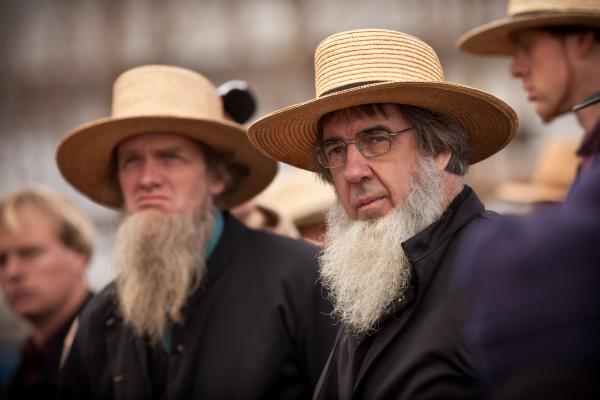CLEVELAND — No one disputes that followers of Amish bishop Samuel Mullet Sr. used horse-mane shears last year to forcibly cut the beards and hair of other members of Amish communities in rural Ohio.
Only their motivation is in dispute as Mullet and 15 of his faithful stand trial in U.S. District Court on federal hate-crime charges. Did religious bias move them to act, or did a compassionate desire to help wayward brethren return to strict Amish ways?
"Why did they do this? I know it sounds strange: Compassion," defense attorney Dean Carro told jurors Tuesday during opening statements. "No crime has been committed. These were purely good intentions."
But prosecutors showed jurors a photo of defendant Johnny Mullet using one hand to grab the long, white beard of Raymond Hershberger, a 79-year-old Amish bishop, and using the other hand to chop.
As Mullet chopped, Assistant U.S. Attorney Bridget Brennan said, Hershberger’s wife screamed and a boy cried, "Don’t cut Grandpa’s beard."
From the outset, the case has attracted national and international attention, in part because of public curiosity about the normally reclusive and peaceful Amish community, and because of the peculiar nature of the alleged crimes.
Nine people lost hair in four separate shearing incidents from September to November, setting the stage for Ohio’s first case under a landmark 2009 federal law that expanded government powers to prosecute hate crimes.
Ten men and six women, all members of an Amish community in rural Jefferson County, are charged with conspiracy and hate crimes. If convicted of all charges, the 16 defendants could face life prison terms.
Carro, who represents defendant Lester Miller, told jurors that beards are for Amish men sacred symbols of their adult manhood, and that long hair is for Amish women "their glory."
Other defense lawyers suggested that the beard- and hair-cutting were meant only to embarrass and disfigure the men and women so they would return to the strict Amish way of life and reconsider their wayward ways.
Prosecutors accused Samuel Mullet Sr., the 66-year-old bishop of the Bergholz community, of orchestrating the attacks in retaliation against religious enemies, though he did not participate in the raids.
"Sam Mullet was the beginning and the end of all of these attacks," Brennan told jurors.
Trouble began in 2005, prosecutors have said, when Mullet excommunicated eight families who abandoned the Bergholz Amish community. A conclave of 300 mainstream Amish church leaders overturned Mullet’s orders, which infuriated him. Some of the beard-cutting attacks were against bishops who reversed Mullet’s excommunication orders.
But Edward Bryan, Sam Mullet’s lawyer, told jurors that the prosecution of his client was a misapplication of the hate crimes act, which he argued was never intended to be used in intrareligious squabbles.
Bryan portrayed Mullet as an "Amish gentleman farmer," the father of 18 children who loved his flock and meant no harm by his followers’ application of strict discipline. He may have known of the beard-cuttings, but didn’t consider them a crime and didn’t order them, Bryan said.
"What Sam is saying is that these were personal family disputes," Bryan said. "Are you going to make a federal case out of this?"
But Brennan countered by reciting a quote from an interview Mullet gave to news reporters last year. "We know what we did and why we did it," Brennan quoted Mullet as saying. "This is all about religion."
James F. McCarty writes for The Plain Dealer in Cleveland. Via RNS.
Photo credit: Amish bidders watch the auction during the Annual Mud Sale to support the Fire Department March 12, 2011 in Gordonville, Pennsylvania. The auctions are held in the spring by the Amish community to raise money for the community. Photo by Richard Ellis/Getty Images
Got something to say about what you're reading? We value your feedback!
